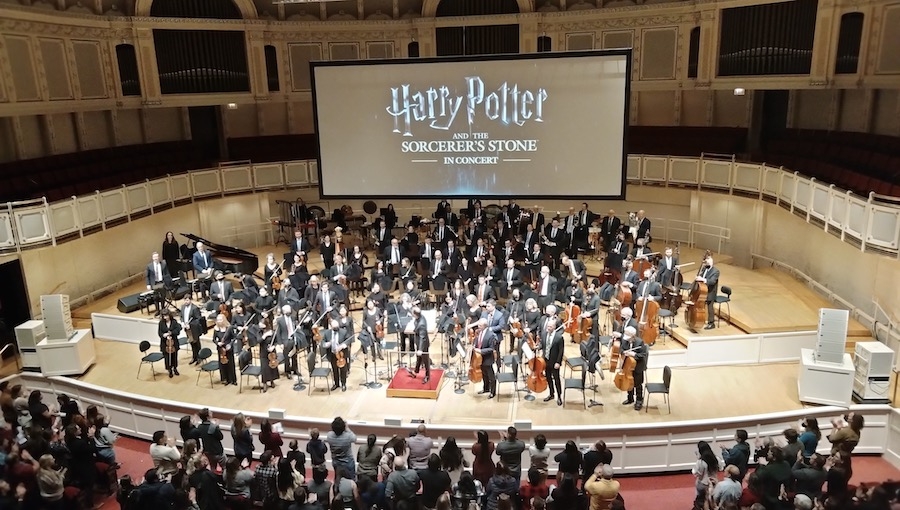I have a confession to make: I have never seen Harry Potter and the Sorcerer’s Stone on the big screen. The first time I watched it was on video tape during the summer of 2002. I had read the book for the first time six months earlier, thought it was just okay, and waited for the film to be released on home video. It was a bad way to watch the film and poor timing, as well. Star Wars: Episode II and the first Spider-Man were in theaters at the time. All of those films were effects heavy, and Harry Potter just didn’t measure up to the other two.
In the years since, I have fallen in love with the books and the movies. I regard the books as the best literature of the modern era. I revisit both incarnations of the story annually and always get something out of them. In fact, have just finished book 7 for the upteenth time. That said I have continued to see the first story in both book and film form as the weakest of all – a fairy tale for children which has to be included in the yearly journey to Hogwarts because it’s the beginning.
On Friday, January 13, I attended a showing of Harry Potter and the Sorcerer’s Stone at Chicago’s Orchestra Hall. Part of the “CSO at the Movies” program, the film was shown without the music. The soundtrack was performed live by the Chicago Symphony Orchestra (CSO). Composed by the legendary John Williams and conducted by Justin Freer, the show was completely sold out. The audience was a wide range of ages, and some kids dressed in Hogwarts robes. When introducing the film, Justin Freer asked the audience which Hogwarts House they belonged to (he named them all and emphasized the “SSSS” in “Slytherin”) and made it clear that people were free – and encouraged – to cheer and clap for their favorite characters and scenes.
Although this wasn’t really “the big screen,” I personally was taken with the film this time around. Although I’ve seen it a million times and could probably recite it backwards and forwards, this was a new experience. The nuances of the soundtrack really jumped out at me. You can’t be a Potter fan and not be familiar with the classic “Hegwig’s theme” which made it all the way through the eight films. It was the rest of the music which I personally found amazing. I’m familiar with the soundtracks, especially in films 2 through 8, but I didn’t realize how rich the score for the first film was. I honestly believe that this era of John Williams was probably his best. Even though he’s remembered more for things he did in the 1970s and eighties (Star Wars, Indiana Jones, ET, etc.), this particular time period – specifically the Harry Potter and the Star Wars prequel soundtracks – were amazing. (I’d like to note here, however, that his score for Harry Potter and the Chamber of Secrets and Star Wars: Episode II – Attack of the Clones sometimes blend into each other. If you don’t believe me, listen to “Quidditch Match Year 2” and “Chase Through Coruscant” back to back.)
The experience of the CSO is unique. There were times in which the music was louder than the film. These moments were amazing because the film sound was still there. The scenes became more exciting. This also helped to smooth over some dated special effects. The troll in the dungeon scene was not as raw as it was at home. Also the Quidditch sequence with the live performance brought the audience into the action, making it very interactive.
There was an intermission after the Halloween sequence. People walking outside the main show floor found themselves humming parts of the soundtrack. I heard “Journey to Hogwarts” which was only in the first two films and came back in the eighth almost a decade later. At the end of the film, the audience clapped through the credits. John Williams was cheered for, as well as Alan Rickman, Robbie Coltrane, and Maggie Smith. Interestingly enough, the actors that were not even acknowledged by the audience were Daniel Radcliffe, Emma Watson, and Rupert Grint. After the film, an older couple beside me started talking and one of them said, “There was a lot of foreshadowing in that story!”
A quick note about the soundtracks of the Harry Potter films: Although I love all of them, especially what Alexandre Desplat brought to the Deathly Hallows, it was a real loss for John Williams to leave after the third film; even the other composers said so at the time. There was an inconsistency (which, to be fair, was started by Williams himself in the third film, Prisoner of Azkaban), and a lot of the themes for each of the characters changed from film to film. Hearing the Sorcerer’s Stone live emphasized the loss.
Harry Potter and the Sorcerer’s Stone Live at the CSO was one of the best experiences I’ve had with this franchise. That’s not a small statement. It made me appreciate the film in a way that I haven’t in the 20 years since it was released. The performance was produced by CineConcerts which operates all over the world (founded by Justin Freer, who conducted this performance). In fact, Sorcerer’s Stone also had a live performance this same weekend in South Carolina. If you have the opportunity, check them out here.

